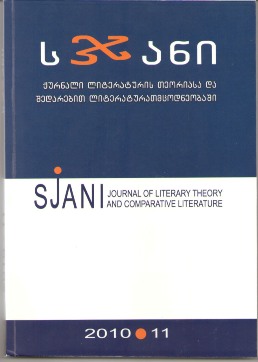„სიბრძნე სიცრუისა“ და „სიბრძნე სიცრუისა“
"The Book of Wisdom and Lies" and "The Book of Wisdom and Lies"
Author(s): Teimuraz DoiashniliSubject(s): Literary Texts
Published by: ლიტერატურის ინსტიტუტის გამომცემლობა
Keywords: Sulkhan-Saba Orbeliani; K Gamsakhurdia; mimesis; modernism; totalitarianism
Summary/Abstract: At the end of the 1920s, in the period of propaganda of ideologically motivated vulgar realism and aesthetic empiricism in Soviet writings, K. Gamsakhurdia publishes a fable type short-story with marked title – “The Book of Wisdom and Lies”. Repeating the conceptual title of the 18th century Georgian classic writer Sulkhan-Saba Orbeliani’s book of fables, the writer implicitly defends the status of invention (lies) and creative fantasy. S. S. Orbeliani’s fable “Italian Artists” serves as a direct source for Gamsakhurdia’s text, whose author not only shares the theory of mimesis but as a writer of late Renaissance (baroque) criticizes aesthetic empiricism from Aristotelian standpoint. “The game” of artists embraces the parodying elements of imitation principles as well, therefore revealing complaint towards the “untruthfulness” of mimetic art. Gamsakhurdia had perceived “Italian Artists” from the standpoint of criticism of mimetic art, which was essential for modernist writers. This serves as means for building bridges between two epochs, followed by modernistic interpretation of classical texts: as artists do play, and play is an irrevocable sign of crisis (Theodor Adorno, Walter Benjamin), modernist Gamsakhurdia detected the negation of mimetic, imitative lies in classic texts and tied it with the collapse of lies and western theories about the crisis of myth. In support of modernistic aesthetics, Gamsakhurdia worked out a witty strategy: under the political-ideological pressure he used the authority of classical heritage –under the mask of S. S. Orbeliani’s book of fables published a modernistic manifesto nourished with Nietzsche’s and Wilde’s anti-mimetic, non-realistic conceptions. Gamsakhurdia’s “The Book of Wisdom and Lies”, depicting the longing towards national roots of modernism, serves as fact for defending creative freedom under totalitarian regime.
Journal: სჯანი
- Issue Year: 2010
- Issue No: 11
- Page Range: 10-27
- Page Count: 18
- Language: Georgian

